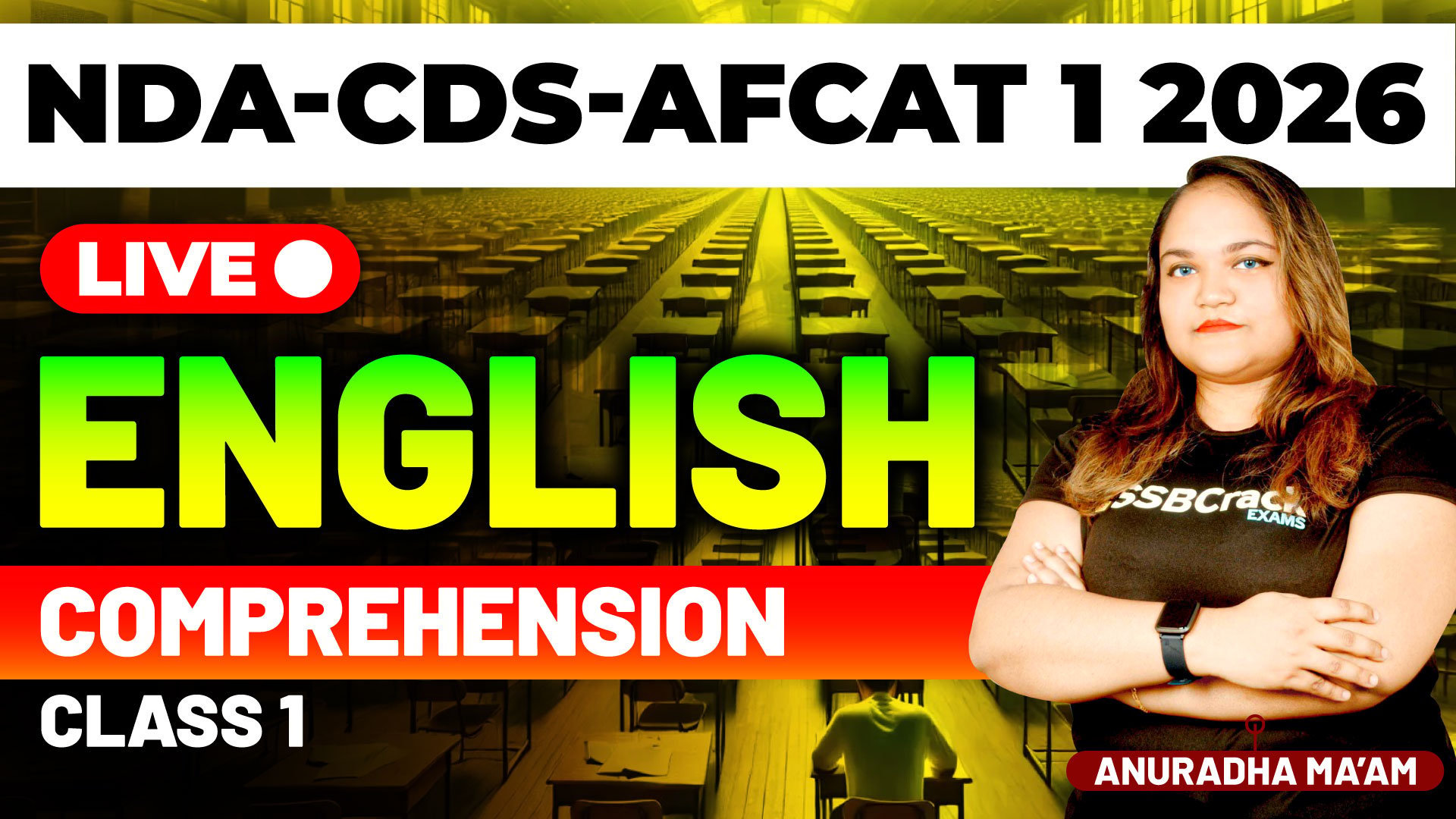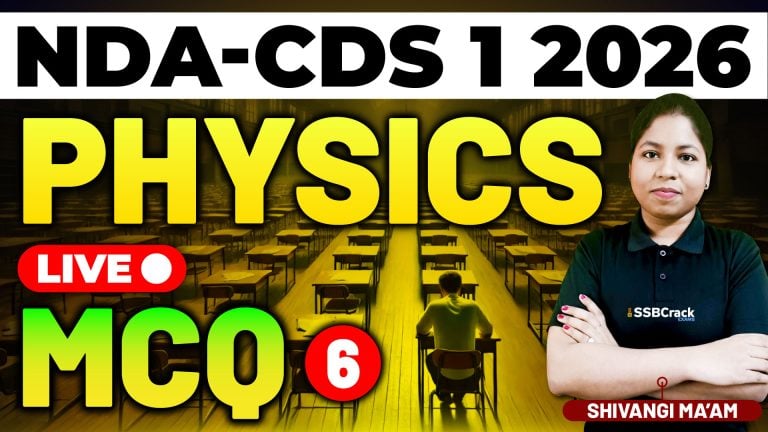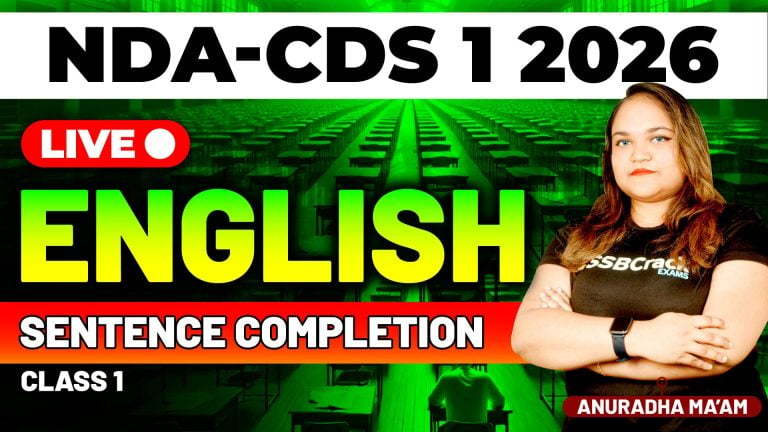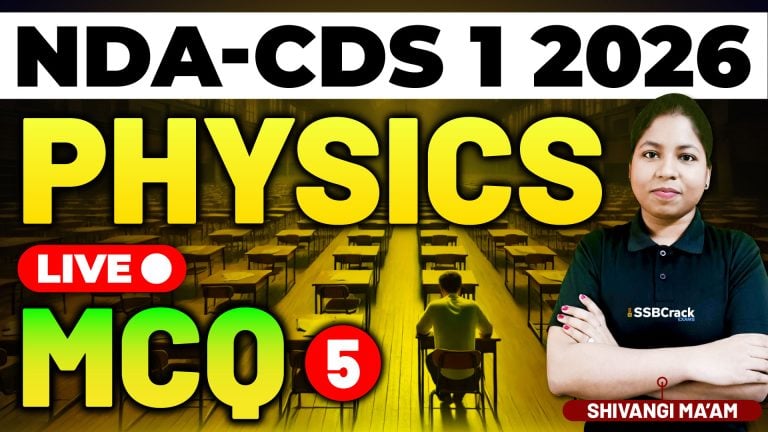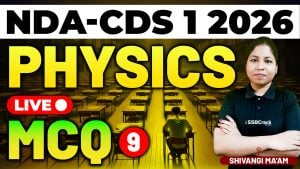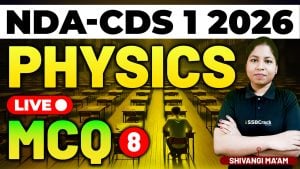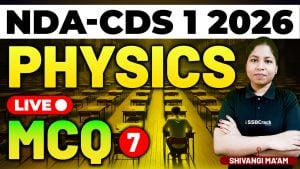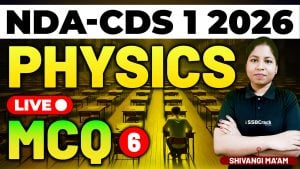The Comprehension section is one of the most scoring yet challenging parts of the English paper in NDA, CDS, and AFCAT examinations. In the English Live Class 1 for 2026 aspirants, we focused on building the foundation of reading, inference-making, and context analysis through a carefully curated set of MCQs from previous year trends.
This article summarizes the key learnings, MCQ patterns, skills developed, and strategies taught in class.
Overview of Class 1: Building Core Comprehension Strength
Comprehension passages in Defence exams are designed to evaluate:
✔ Reading Speed
Students must read 250–350 words quickly without losing focus.
✔ Understanding of Main Ideas
Recognizing the central theme of the passage.
✔ Ability to Infer
Drawing conclusions not directly stated but strongly implied.
✔ Awareness of Tone & Purpose
The author’s attitude forms the basis of several MCQs.
✔ Context-based Vocabulary Skills
Words and phrases must be interpreted using surrounding clues.
In this class, we analyzed how these skills reflect in MCQs asked in NDA, CDS, and AFCAT.
MCQs Covered in Class: Patterns & Learning Outcomes
During the class, aspirants solved a set of carefully selected MCQs modeled on Defence exam patterns. Below is a summary of the types of questions and key learnings.
(A) MCQs on Central Idea / Theme
These questions assess whether the student can identify the primary message of the passage.
Example discussed in class:
A passage on technological dependence was used to ask:
➡ “What is the central message of the passage?”
Learning Outcome:
Students understood how to filter out examples, statistics, and anecdotes to reach the core theme.
(B) MCQs on Facts vs. Inferences
A passage on environmental degradation included questions such as:
➡ “Which of the following is an inference from the passage?”
Learning Outcome:
Students learned the difference between:
- Facts: Directly mentioned
- Inferences: Implied
- Assumptions: Hypothetical, not valid as answers
(C) MCQs on Tone of the Author
Passages included tones such as:
- Critical
- Humorous
- Analytical
- Optimistic
- Concerned
Learning Outcome:
Aspirants learned to identify how tone-based words (“however”, “yet”, “but”, “ironically”) signal the author’s attitude.
(D) Vocabulary-Based MCQs from Context
This included questions like:
➡ “What does the word ‘mitigate’ mean in the context?”
Learning Outcome:
Students understood how to decode meaning by analyzing preceding and following sentences.
(E) MCQs on Reference/Pronoun Meaning
Questions such as:
➡ “The word ‘these’ in the third sentence refers to?”
Learning Outcome:
Students practiced tracking pronouns to avoid misinterpretation.
(F) MCQs on Logical Completion / Interpretation
These required selecting the option that completes the author’s argument logically.
Learning Outcome:
Students improved their ability to predict the writer’s next logical idea.
Importance of Reading Skills for Comprehension in NDA, CDS & AFCAT Exams
High accuracy in comprehension derives largely from efficient reading, which includes:
1. Skimming and Scanning Ability
- Skimming helps capture the central theme quickly.
- Scanning enables locating factual answers instantly.
A student who masters these saves 3–4 minutes per passage.
2. Understanding Sentence Connections
Recognizing how ideas link helps answer inference-based questions.
Words like however, therefore, although, because are essential connectors.
3. Identifying the Author’s Intent
Essential for tone and theme-based MCQs in CDS and AFCAT.
4. Recognizing Key Words
Every question has a keyword, and answers lie around that portion of the passage.
5. Eliminating Options Logically
Comprehension questions often contain tricky distractors.
In class, students learned how to:
- Avoid extreme options
- Discard answers that go beyond the passage
- Choose options supported by evidence
Why Comprehension is Important for Defence Aspirants
The Comprehension section is not just about English—
It reflects officer-like cognitive skills such as:
- Logical reasoning
- Situational judgement
- Observational ability
- Decision-making
- Analytical thinking
These skills are tested in SSB too, making RC practice valuable beyond written exams.
Key Strategies Shared with Students in Live Class 1
✔ Read the passage before reading questions (NDA & AFCAT strategy)
✔ Read the questions first for CDS (saves time on longer passages)
✔ Use elimination for inference questions
✔ Do not rely on outside knowledge
✔ Identify keywords for fact-based questions
✔ Find synonyms/antonyms using tone & context
✔ Maintain calm while reading—avoid overthinking answers
Final Takeaways from English Live Class 1
By the end of Class 1, aspirants strengthened their foundation in:
- Understanding comprehension structure
- Handling exam-level MCQs
- Improving reading accuracy
- Interpreting tone & theme
- Solving vocabulary using context clues
This session ensured that aspirants are now confident and equipped to tackle the Comprehension section across NDA, CDS & AFCAT with clarity and precision.
